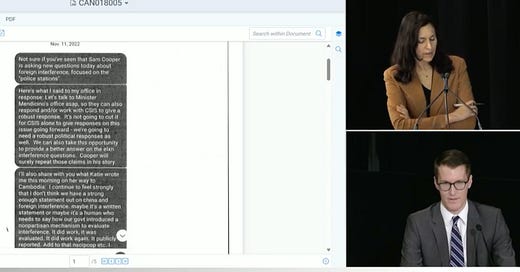Breaking: Trudeau’s Aides Admit Key Foreign Interference Memos On Targeting of Canadians Were Not Shared Amid Rising Geopolitical Tensions
As geopolitical shock reverberates over Canada’s claims that six Indian diplomats were involved in targeting Canadians in murder, assault, and extortion plots, Justin Trudeau’s top aides admitted that in recent years they failed to elevate critical reports to the Prime Minister on how Canadian citizens and political leaders were being targeted by hostile states.
The Hogue Commission heard explosive testimony claiming that at least four key memos meant to brief Trudeau on foreign interference targeting Canadian Members of Parliament were not delivered to him. One memo from 2019, and another from 2020, could have led to briefings for opposition leader Erin O'Toole on how he and his party were being targeted by foreign interference, according to testimony.
Other intelligence could have warned Conservative MP Michael Chong in 2021 that his family was being targeted by Chinese secret police.
"My recollection is that the information contained in the intelligence report was not a physical threat to Mr. Chong or his family," senior Trudeau aide Brian Clow said, explaining that he believed the intelligence related to the gathering of information on Chong and his family, which is why Chong wasn’t alerted.
Commission Counsel pressed Clow further, referencing recent revelations regarding Indian diplomats' alleged involvement in violently targeting Canadians.
"And given what broke in the news yesterday, where we have a situation of the RCMP having made public statements about the involvement of Indian diplomats having gathered information and done certain things with it in terms of intimidation, harassment, plots, murder, and the other things they reported on yesterday, I just want to confirm that was not your understanding of what the nature of this targeting was of Mr. Chong?"
"No," Clow responded.
Clow acknowledged that two memos, from 2019 and 2020, which were intended to brief Trudeau on escalating threats to other Parliamentarians, were shelved due to external factors, including the COVID-19 pandemic and the 2021 election call.
"We all agreed this briefing should happen," Clow said, referring to a December 2020 note for Trudeau, which included draft letters from the Prime Minister to opposition leaders informing them of the government's planned response on interference.
These two memos are part of a broader context of four pivotal reports central to the inquiry. The Commission and a related review have uncovered deep, ongoing divisions between senior Trudeau officials and Canadian intelligence agencies over Chinese interference in Canada’s elections. These divisions are particularly acute regarding two key reports: the Targeting Paper prepared by CSIS and the Privy Council Office (PCO) January 2022 Special Report.
The Special Report, reviewed by The Bureau, alleges that 11 Toronto-area candidates were implicated in a 2019 federal election interference network. This network involved clandestine fund transfers from the Toronto Chinese Consulate into proxy networks. Testimony during the inquiry has focused heavily on this Special Report, which was compiled by the Intelligence Assessment Secretariat within the PCO. Drawing on over 100 CSIS reports, the document outlines a sensitive investigation in the Greater Toronto Area that ultimately led CSIS to seek a technical surveillance warrant in March 2021.





